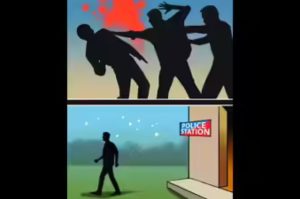Kolkata Neighbourhood Tragedy — A seemingly ordinary altercation between residents of a densely packed neighborhood in Bowbazar took a tragic turn when 40-year-old Md Ezhar Ahmed collapsed after an alleged physical push during the dispute. While no visible injuries were found on the victim, police have launched a probe into the sequence of events that led to his sudden death, highlighting once again the dangers of unresolved local disputes and the thin line between confrontation and fatality.

What Happened in Bowbazar?
The incident occurred around 10:30 a.m. on Gopal Chandra Lane, a bustling, congested locality in central Kolkata. According to preliminary reports, Ahmed was involved in a verbal dispute with neighbors with whom he shared a tense relationship. During the confrontation, Ahmed was allegedly pushed by one of the individuals.
Eyewitnesses say that shortly after the push, Ahmed appeared breathless and unwell. He reportedly collapsed on the spot, prompting immediate efforts from neighbours to rush him to the Calcutta Medical College and Hospital. Despite medical attention, he was declared dead in the evening.
Kolkata Neighbourhood Tragedy: Initial Police Response
The Bowbazar Police registered the case as an unnatural death and are awaiting the final post-mortem report to determine the cause.
A senior officer said, “We have begun questioning individuals present during the altercation. There are no signs of major physical assault, but we are not ruling anything out until the autopsy confirms the medical cause of death.”
No formal complaint had been filed by the victim’s family at the time of writing. However, police have stated that action will be taken based on their statement and medical findings.
Cause of Death: Awaiting Confirmation
While the push may have appeared minor, the incident raises questions about the medical implications of emotional or physical trauma during high-stress situations. Cardiac arrest or sudden internal failure triggered by stress is not uncommon, especially in middle-aged individuals.
Medical experts say “vasovagal syncope” or sudden cardiac episodes can sometimes be triggered by sudden conflict or emotional distress, especially if underlying health conditions exist. Only a complete forensic examination can confirm whether the death was accidental, induced, or triggered by trauma.
Community Shock and Tensions
The death sent ripples across the tightly knit neighborhood. Locals reported that Ahmed had lived in the area for years and was known to have longstanding tensions with at least two families in the building.
A resident, requesting anonymity, said, “We’ve seen them argue before, especially about water connections and garbage disposal. But no one expected it to end this way.”
In light of the incident, community leaders have urged residents to resolve disputes through discussion or legal channels rather than confrontation.
Legal and Safety Considerations
Under Indian law, a death resulting during a conflict—even without weapons or premeditated violence—can still lead to serious charges under the IPC (Indian Penal Code):
- Section 304 (Culpable Homicide Not Amounting to Murder) may be invoked if the push is found to have led directly to death without intent.
- If the death is deemed entirely accidental and caused by medical conditions, it could remain classified as Section 174 CrPC (Unnatural Death).
The case also highlights the growing need for civil mediation services in urban neighborhoods where interpersonal tensions often go unresolved and escalate unexpectedly.
Reference: Indian Penal Code Sections 299–304 (https://legislative.gov.in)
The Bigger Picture: Growing Tensions in Urban Spaces
Kolkata has seen several recent incidents where local arguments have escalated into violent or even fatal episodes:
- In June, a parking dispute in Behala led to a man being severely injured.
- In April, a woman in Burrabazar filed a complaint after a neighbor hit her with a wooden plank over noise complaints.
- In March, a college student died following a physical fight in a dormitory, raising serious questions about safety protocols and conflict resolution mechanisms in both residential and institutional settings.
These incidents show a disturbing trend: rising urban stress and inadequate conflict mediation mechanisms in overcrowded residential zones.
Preventive Measures Needed
To reduce such tragedies, law enforcement officials and psychologists recommend the following:
- Mediation cells in local wards to help residents resolve disputes amicably.
- Awareness programs on the consequences of physical confrontation—even unintentional ones.
- CCTV installations in shared apartment entrances to ensure incidents can be reviewed objectively.
- Regular health checks and mental health support, especially for elderly and high-stress individuals.
What Happens Next?
The police will proceed with:
- The post-mortem report, which will reveal internal trauma or other causes of death.
- Eyewitness statements, collected from neighbors and family members.
- Any complaint lodged by the family, which could lead to legal escalation depending on their allegations.
Final Thoughts
Md Ezhar Ahmed’s death may ultimately be determined as accidental, but it reveals a deeper problem in Kolkata’s urban fabric—the absence of proper dispute resolution, overpopulation-induced friction, and unchecked emotional volatility. This incident is a somber reminder of how fragile life is when society fails to build guardrails around everyday conflict.
Also read: Home | Channel 6 Network – Latest News, Breaking Updates: Politics, Business, Tech & More

